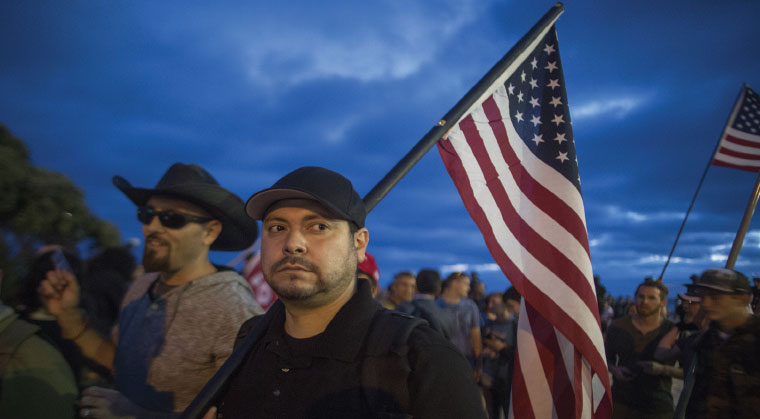How Dangerous is the KKK?


Can Trump shake the stigma of alt-right support? (Photos: Flash 90 AP Images AFP/Imagebank)
T en years ago when Ken Livingstone was mayor of London I was covering a Conference of European Rabbis convention in that city. Over a British breakfast that included bagels and lox and with a view of the River Thames I was interviewing Rabbi Jonathan Sacks who was then Britain’s chief rabbi.
Livingstone was busy fending off charges of anti-Semitism for a series of offensive and outrageous public comments including personal attacks on British Jews and branding Ariel Sharon as a war criminal while praising the radical British Imam Yusuf al-Qaradawi as an authoritative Muslim scholar. When I asked Rabbi Sacks how he perceived Livingstone’s threat level he replied: “If he could control a crowd and motivate it to action then I would be worried. But I have seen him in front of 10 000 people in Trafalgar Square and he doesn’t have that ability.”
Anxious American Jews are asking the same question today about the threat posed by some of President-elect Trump’s most noxious supporters mainly David Duke the white supremacist and anti-Semitic conspiracy theorist and former Imperial Wizard of the Knights of the Ku Klux Klan.
As a politician of influence Duke is an abject failure. He has run or offered his candidacy for public office ten times winning just once — a seat in the Louisiana House of Representatives where he was an ineffective legislator. On social media he is a flop: he has only 24 300 followers on Twitter.
The Ku Klux Klan itself is more of a social club for racists than an active terror group said Leon Neyfakh who wrote an investigative report on the KKK this summer in Slate.
“What I learned is that the KKK no longer really exists at least not as the monolithic group of vigilantes it once was” wrote Neyfakh. “Today it’s a collection of 30 or so independent groups made up of small local chapters that embrace the KKK brand and some of its traditions as a means of appearing more formidable than they are.”
But Neyfakh is far from the only authority on the subject. Considering the murder mayhem and mischief the KKK has fomented during its 150-year history it pays to be vigilant. David Cunningham a professor and chair of sociology at Brandeis University told the PBS series American Experience that a greater number of KKK organizations exist today than at any other point in the group’s long history. While nearly all are small marginal and lacking in meaningful political or social influence he added two caveats to that reassuring portrait: “The first is that marginal isolated extremist cells themselves can become breeding grounds for unpredictable violence.” Ask security and law enforcement officials who are fighting the global war on terror and they will readily concur. The second caveat is that racism is not subject to extinction. The KKK has a proven record of accomplishment of reinventing itself at death’s door.
Created during the Reconstruction period following the Civil War KKK militiamen lynched and terrorized black people throughout the South. The KKK got its second wind during the dire economic times between World Wars I and II when it amassed a membership of 4 million (the US population in 1930 was 123 million) and succeeded in electing hundreds of candidates to local state and federal office.
Cunningham traces the Klan’s undoing in part to these elected officials’ inability to offer any serious civic and social initiatives other than its association with violence and racial terror. The group was reborn again in the 1960s as a backlash to Congressional passage of the Civil Rights Act. David Duke is a child of the 1960s. In his sophomore year at LSU in 1970 he formed a white supremacist group on campus and wore a Nazi uniform to a demonstration at Tulane University protesting the speech of Jewish attorney William Kunstler.
Despite his personal election defeats Duke’s movement has made an impact.
Cunningham along with Rory McVeigh of the University of Notre Dame and Justin Farrell of Yale University have analyzed county voting records in ten Southern states in which Duke’s KKK actively recruited members in the 1960s.
In five of the presidential elections between 1960 and 2000 Southern counties with KKK activity in the 1960s showed a statistically significant increase in Republican voting compared to counties with no established KKK chapter and that there was a clear link between racial attitudes and pulling the lever for the GOP.

Democrats used an old image of a young David Duke at the party’s convention this summer to stoke partisan fires
“The fact that such efforts continue to predict partisan allegiances today demonstrates how the impact of a social movement can endure long after the movement itself has declined as well as providing a new explanation of political polarization in the US” write Cunningham McVeigh and Farrell. “So while today the KKK appears an anachronism and perhaps less of a threat than other brands of racist hate we still should vigilantly oppose racist entrepreneurs who seek to exploit the historical cachet of the KKK to organize new campaigns advancing white supremacist ends.” Fast-forward to the 2016 presidential campaign.
While many decent and law-abiding Americans voted for Donald Trump because they agree with him that Islamic terror is the major threat to US security and Mexican immigration poses a significant demographic and economic peril Trump himself — whether he truly likes it or not — has awakened the ghosts of men wrapped in white sheets and hoods.
The threat from the far right is also not limited to the US. It is global.
In Europe three countries — the Netherlands France and Germany — are holding general elections in 2017.
Polls in France and the Netherlands show more than one-fourth of the public support far-right parties alongside 14% of German voters.
All the world’s eyes are now on Donald Trump. If he gets off to a fast and effective start more Europeans will be encouraged and emboldened to get out and vote for parties with leaders like Trump. Millions of Americans are scared about the rise of today’s successor to the KKK — the so-called Alt-Right. That fright is not limited to blacks who have been the KKK’s biggest victims or to Jews the world’s longest standing victims of religious persecution.
Trump’s refusal to renounce the support of the Alt-Right can be understood in the context of a tight election in which white votes mattered. But the election is over now. People will be looking for Trump to distance himself from that. But whether he does or does not it may be too late. The cat is already out of the bag and the KKK seems well on its way to experiencing its fourth life.
Oops! We could not locate your form.







